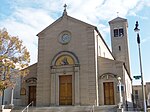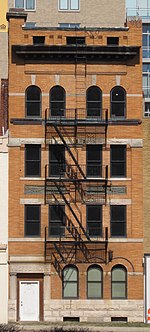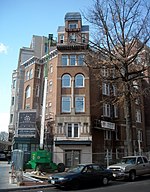Lillian & Albert Small Capital Jewish Museum

The Capital Jewish Museum, officially the Lillian & Albert Small Capital Jewish Museum, is a historical society and its planned museum in Washington, D.C., focused on the history of Jewish life in the American capital city and the surrounding Washington metropolitan area. Formerly known as the Jewish Historical Society of Greater Washington (JHSGW), the organization adopted a new name in 2018 as it prepared for the opening of its new museum facility, expected in 2021. The organization was founded in 1960 and incorporated as a nonprofit organization in 1965. From 1975 to 2016, it operated the Lillian & Albert Small Jewish Museum in the historic Adas Israel Synagogue building, an 1876 structure that is the oldest surviving synagogue in the city. The synagogue building has been moved three times in its history, with a final move in 2019 to become part of the planned Capital Jewish Museum.
Excerpt from the Wikipedia article Lillian & Albert Small Capital Jewish Museum (License: CC BY-SA 3.0, Authors, Images).Lillian & Albert Small Capital Jewish Museum
Massachusetts Avenue Northwest, Washington
Geographical coordinates (GPS) Address Website Nearby Places Show on map
Geographical coordinates (GPS)
| Latitude | Longitude |
|---|---|
| N 38.8985 ° | E -77.015 ° |
Address
250 Mass Ave
Massachusetts Avenue Northwest 250
20001 Washington
District of Columbia, United States
Open on Google Maps








